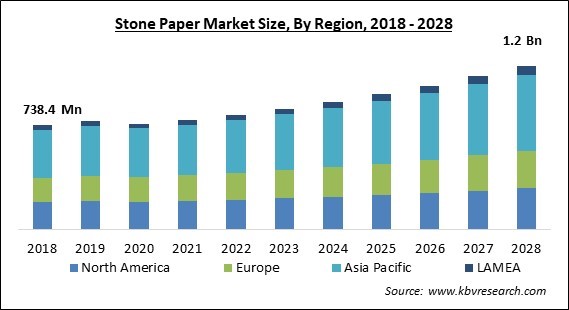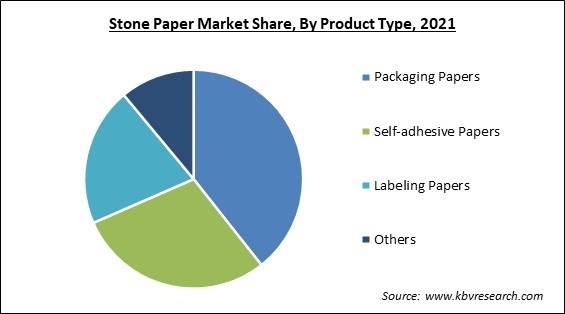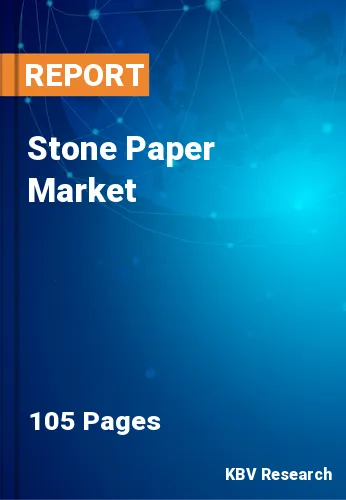The Global Stone Paper Market size is expected to reach $1.2 billion by 2028, rising at a market growth of 6.1% CAGR during the forecast period.
Stone paper, also referred to as mineral paper, bio-plastic paper, rock paper, and rich mineral paper, is a durable paper-like material composed of calcium carbonate and HDPE resin. They can be used for various similar purposes as paper made from cellulose. Calcium carbonate derived from stone (rock) is the primary constituent of stone paper. Crushed stone is combined with a non-toxic and recyclable binder, such as HDPE, to generate stone paper.

Stone and traditional paper are distinguished primarily by their respective raw materials. Traditionally, plant fibers and a great deal of water are used in the production of paper, while stone paper does not require plant fibers or water in any way. In addition, the production of stone paper produces no carbon emissions, necessitates no acid, base, or bleaching chemicals, and is recyclable.
Stone paper is suitable for a variety of printing operations, writing, and packaging applications. It is not dependent on wood pulp, which is one of its primary advantages. After 9 to 12 months of exposure to the elements, the paper will decompose without emitting harmful gases and ultimately vanish. Also, it burns quickly without emitting hazardous fumes. Stone paper is resistant to water. It is tearable without breaking.
Due to the recyclable, eco-friendly, and waterproof characteristics of stone paper, the product's demand is anticipated to increase significantly over the forecast period. In addition, rising environmental concerns over deforestation to produce wood pulp are anticipated to boost demand for the product to replace conventional paper over the projected period.
COVID-19 negatively affected the stone paper market. Because of the outbreak, governments across the world have implemented travel restrictions and restrictions on logistics. The temporary cessation of production has impacted the demand for stone paper. The onset of the pandemic caused severe harm to the market's supply chain and demand order. Since the beginning of the pandemic, packaging and paper makers have anticipated a drop in demand, resulting in economic hardship for businesses, customers, and communities. Due to the economic crisis, consumers' demand for products declined, which harmed the stone paper income creation and manufacturing.
Stone paper employing pure-white silica powder as a substitute for CaCO3 is considered green energy stone paper since no acidic gas is created during its combustion in an incinerator. Also, there is an attempt to replace all inorganic minerals with recycled paper fibers. In addition to good physical and mechanical features, stone papers with low emissions and the ability to save natural and energy resources are being produced. Due to the inability of HDPE resins to biodegrade, attempts have also been made to identify alternative synthetic resins. This action was also taken to cut production costs. Thus, the expanding food and beverages, medicines, personal care, and packaging sector, would give the stone paper market enticing growth potential and aid in the market’s growth.
Stone paper minimizes reliance on trees, contributing to sustainable development goals and minimizing deforestation. These are high-quality items that are water-resistant, recyclable, and have a high draw strength. They are utilized in the writing, printing, and packaging industries. They are also employed in producing cardboard, notebooks, and books. Hence, the rising demand for eco-friendly and sustainable products for printing, writing and books etc. are anticipated to drive the expansion of the stone paper market due to its less adverse effects on the environment.
Limestone is extracted from mines primarily through crushing, drilling, blasting, and processing. Mining and subsequent processing hurt the environment, causing water depletion, soil erosion, forest deforestation, water, soil, and air pollution, biodiversity loss, soil, and rock mass instability, agricultural land deterioration, and landscape changes. During activities such as excavations, haul road construction, drilling, blasting, and transportation, dust particles are released into the environment. This will restrict the stone paper market growth.
Based on product Type, the stone paper market is segmented into packaging papers, labeling papers, self-adhesive papers and others. The self- adhesive papers segment acquired a substantial revenue share in the stone paper market in 2021. This is because the need for self-adhesive wall decals is expanding significantly in the architecture and construction business. They are extensively utilized in roofing materials, walls, and aesthetic places. The self-adhesive stone paper applications is predicted to increase as a result of their simple installation, vast selection, 3D and 2D appearances, and recent design trends in living rooms, kitchens, bedrooms, and bathrooms.

| Report Attribute | Details |
|---|---|
| Market size value in 2021 | USD 777.8 Million |
| Market size forecast in 2028 | USD 1.2 Billion |
| Base Year | 2021 |
| Historical Period | 2018 to 2020 |
| Forecast Period | 2022 to 2028 |
| Revenue Growth Rate | CAGR of 6.1% from 2022 to 2028 |
| Number of Pages | 105 |
| Number of Table | 180 |
| Report coverage | Market Trends, Revenue Estimation and Forecast, Segmentation Analysis, Regional and Country Breakdown, Companies Strategic Developments, Company Profiling |
| Segments covered | Product Type, Region |
| Country scope | US, Canada, Mexico, Germany, UK, France, Russia, Spain, Italy, China, Japan, India, South Korea, Singapore, Malaysia, Brazil, Argentina, UAE, Saudi Arabia, South Africa, Nigeria |
| Growth Drivers |
|
| Restraints |
|
Region-wise, the stone paper market is analyzed across North America, Europe, Asia Pacific, and LAMEA. The Asia Pacific region held the highest revenue share in the stone paper market in 2021. This is due to the rising urbanization, growth in sustainability consciousness, and the implementation of plastic restrictions in Asia-Pacific; the stone paper market is growing. The increasing demand for advanced packaging applications primarily drives the market in the Asia-Pacific region.
Free Valuable Insights: Global Stone Paper Market size to reach USD 1.2 Billion by 2028
The market research report covers the analysis of key stake holders of the market. Key companies profiled in the report include TBM Co., Ltd., Stone Paper Global Technologies Ltd., AM Packaging Company Limited, Shenzhen Stone Paper Enterprise Ltd., WestRock Company, Taiwan Longmeng Composite Materials Co., Ltd., STP Stone Paper Products GmbH, Sphera International, Pishgaman Sanat Sabz and The Stone Paper Company Limited.
By Product Type
By Geography
The global Stone Paper Market size is expected to reach $1.2 billion by 2028.
Constant efforts for product enhancement are driving the market in coming years, however, Strict regulations for limestone mining restraints the growth of the market.
TBM Co., Ltd., Stone Paper Global Technologies Ltd., AM Packaging Company Limited, Shenzhen Stone Paper Enterprise Ltd., WestRock Company, Taiwan Longmeng Composite Materials Co., Ltd., STP Stone Paper Products GmbH, Sphera International, Pishgaman Sanat Sabz and The Stone Paper Company Limited.
The expected CAGR of the Stone Paper Market is 6.1% from 2022 to 2028.
The Packaging Papers segment is leading the Global Stone Paper Market by Product Type in 2021, and would continue to be a dominant market till 2028; thereby, achieving a market value of $442.9 Million by 2028.
The Asia Pacific market dominated the Global Stone Paper Market by Region in 2021, and would continue to be a dominant market till 2028; thereby, achieving a market value of $538.6 Million by 2028.
Our team of dedicated experts can provide you with attractive expansion opportunities for your business.

